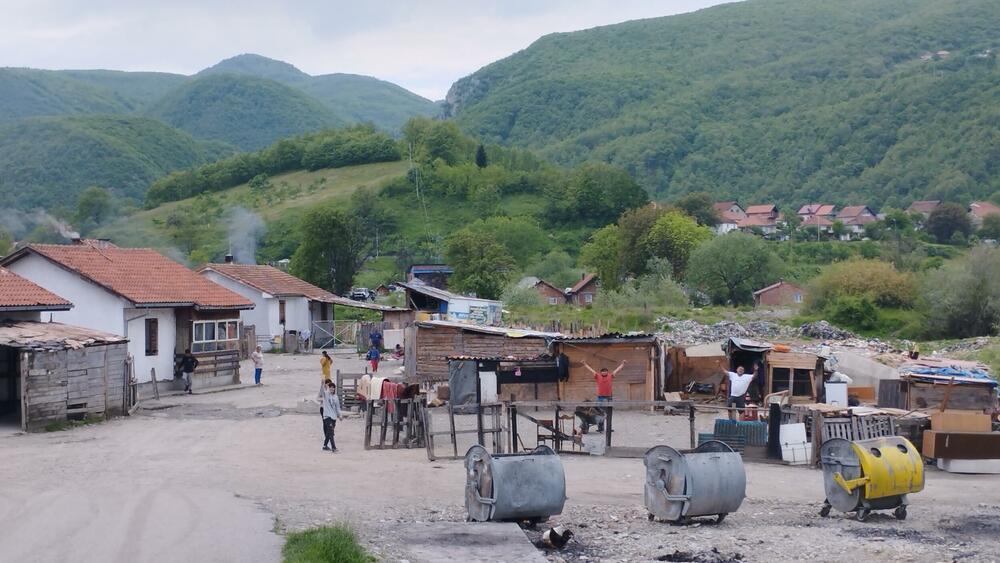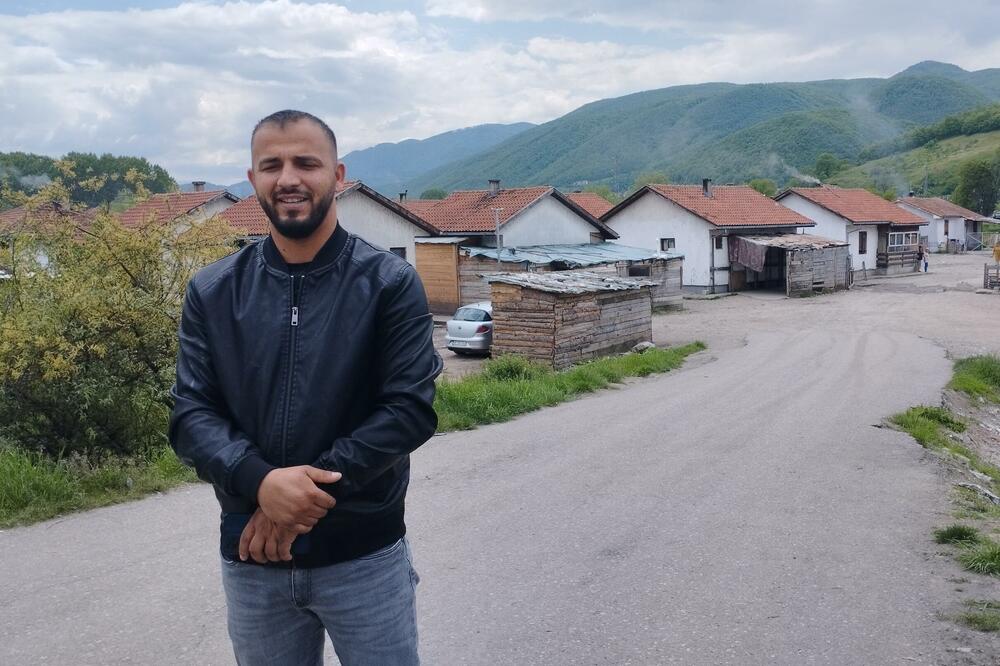Parallel to, but far from, official institutions, with the aim of preserving the order and value system of the community, as well as customs based on stubborn loyalty to patriarchy and tradition, the custom of gathering the Council, responsible for resolving various conflicts, persists to this day among Roma and Egyptians in Montenegro. .
Men's room - is the usual name for a "session" of 10 men, divided into two groups, each led by a leader.
In the Riverside refugee settlement in Berane, where mostly Egyptians live, but also on the other side of Lim, where the Roma are, as he told "Vijesti" Sultan of Vienna, many quarrels were silenced in the Room, numerous troubles were prevented, injustices were corrected, property was justly divided, but also families and marriages were preserved. Because of this, he claims, the police and courts had less work to do.
The way Egyptians in Brena talk about the importance of the Council hints at the need to prevent the interference of those who cannot or do not want to understand that modern standards cannot be applied to all aspects of the people's life in community conflicts. Also that more sensitivity is needed for what is "sacred" and "important" to them.
Beća, who is the president of the Association for the Support of Roma and Egyptians, was the youngest head of the Council for several years and claims that his trust in that "institute is enormous. This is so, he explains, primarily thanks to the strictly prescribed code of ethics, good intentions and customary norms, which, as he points out, the members of the Council adhere to almost without exception.
The way the Men's Room functions, the decisions it makes and the sanctions it prescribes, one could criticize a lot from the position of someone who does not know the postulates on which the life of Roma and Egyptians has been organized throughout the centuries. However, it is difficult to find fault with the motives that sustain the Council.
"The goal is to protect every member of the community from injustice, conflicts that could end in accidents, to prevent the negative impact on the community of individuals who behave inappropriately... Thanks to the councils, many children did not become orphans, many women kept a roof over their heads and they were not 'let down the road', blood feuds were stopped, many marriages survived, property was divided fairly... In this way, the honor and image of the family and community were often preserved, in this way we protected ourselves from the injustice of the environments in which we were Cheers. It is also important to say that, despite numerous prejudices and misunderstandings, women before the Council always have 'a little more right' than men, but also that one of the privileges is the welfare of children", says Beća.
He also explains that the existence of the Council in the past, and even today, was partly a product of fear and mistrust of official institutions. Also, a way to avoid the pitfalls of not understanding environments.
As Beća explains, decisions about the representatives of his people were often made by those whose minds were clouded by stereotypes.

And only those who are the embodiment of wisdom, justice and experience of a community should sit in the Men's Room. The members of the Council, as well as the heads of the two groups, each of which represents one side in the conflict, are not permanent. However, it is possible to be in these roles more than once, especially if the community has judged that they deserve it. According to Sultan, the head and members are chosen without deviation from the rules and through several precisely established steps.
"A person who believes that he is suffering some injustice, which can be corrected in the Room, goes to a man whose wisdom, experience and righteousness instill confidence and qualify him as a leader. Tell him your problem. When he hears what it is about, the chief gathers a group of four other men who must also be without blemish in character. The other side in the conflict also chooses a leader, who, by the same principle, gathers another group. Before the meeting in the Men's Room, the members do not discuss anything, but only get acquainted with the basic facts related to the problem and agree on the time when the Council will start working", explains one of the youngest heads of the Council of Egyptians.
Session on neutral ground
What happens in the Chamber must not be available to members of the community, nor to the general public, so "Vijesti" had the opportunity to see only a simulation of the beginning of the session. The two groups meet on "neutral ground", that is, in the home of a family that is in no way involved in the event to be discussed. The group that is gathered at the initiative of the one who believes that he has been wronged enters first. According to the seating arrangement, it is clear that the leader is in the "front of the room". Not long after, another group enters and sits down according to the same principle, so the two leaders are next to each other. The order of entering the room, and then the place where they sit in relation to the leaders, is a sign of the "importance" of each member.
Everything that happens after that is according to the rules, worked out in detail and from which it is difficult to deviate, and any deviation from the centuries-old way of talking in the Men's Room - is sanctioned. The cigarette has a strong symbolism throughout the work of the Council. By "throwing a cigarette", i.e. by offering a cigarette to members of the Council, it is determined who will speak first and when they will start speaking, how long they will speak... The cigarette is used to "notice" that someone has gone too far in the length or manner of speaking, but it also takes away the floor.
The host of the house is first honored with tobacco and this is a sign that he can start the first part of the conversation, which is not related to the problem that brought the 10 men together. The initial conversation, Beća explains, is for the members of the Council to get to know each other and to relax, and is usually about everyday topics. Also, it is a way to reduce the possible negative charge towards the "adversary group". The second "tossing a cigarette" is an introduction to the discussion of the conflict, and that's when the "trial" begins. If a woman is a party to the dispute, regardless of whether she is the accused or the injured party, she is the first to speak before the Council. If she is accused by a man, she has the right "to a few words of answer" even after his testimony, says the interlocutor of "Vijesti".
While the two contending parties present their arguments, no one from the Council comments. After that part is over, and those who are arguing say what they have, they leave the room. This is the signal to start the discussion - the decision-making process. By the time they reach the goal, which, as they say, is the most fair and unanimous decision, several months may pass. A significant part of the discussion that takes place in the Council is based on anecdotes and "commonplaces", without mentioning the actors of the case that was the reason for the gathering.
"This is done with the intention of drawing a lesson from those stories, to 'message' something to the other side, to warn of the consequences, if no solution to the dispute being discussed is found. These are anecdotes and stories that are figuratively applicable to the conflict they are supposed to resolve. I call that part of the Council's work 'poetry' because it is full of emotional charge, linguistic and stylistic embellishments, metaphors... The other side has the right to respond to that, which, among other things, shows that it has understood the essence. It happens that some members do not understand the point, so then a simpler and easier to understand story is told on the other side. If a member of the Council does not understand even after that, it is judged that he has no place in the Room of Men", explains Beća.
Discussions in the Chamber of Men continue until a decision is made which, he says, "will be in the best interest of both the individual and the community, as well as what is the moral code." It is rare that the two parties do not reach an agreement, and if that happens - the Council splits.
In the Men's Room, in addition to making a decision, punishments are prescribed, which can be different, from fines to expulsion from the city.
"In addition to the aforementioned virtues, the head of the Council should also have a large family, i.e. many brothers and sons. This is because someone needs to stand behind him if adherence to the decision made by the Council is called into question. The implementation of the decision, i.e. the extent to which those affected by it comply, is carefully monitored. If one of the participants in the dispute is not satisfied with the behavior of the other side, he informs the member of the Council who is in charge of it, and he then informs the head," explains Beća.
Corruption is rare
The Council's decisions are supported by the whole community and they are not questioned, says one of the leaders in the Men's Room. The members of the Council, before or after the end of the work, by swearing on the "holy book" (Bible, Koran) or giving their word guarantee that they are "pure of face and pure of heart".
"There is a deep-rooted belief in our people that misfortune will befall a family whose member in the Council was malicious or corrupt. Because of this, there is a great fear of dishonest work, so these situations are rare. However, it happened recently that some members were found to be corrupt. Apart from being punished, no one ever invited them to the Council. Suspicion that some are not with good intentions can also be shown during the conversation in the Room, also by a special way of offering a cigarette", says Sultan.
In order to ensure the greatest possible objectivity, commitment and will for the most just decision, he says, it happens that in two groups in the Men's Room, on different sides, there are also two brothers. This is, among other things, a guarantee that a decision will be made more quickly, and the conversation will be correct and aimed at solving the situation in the most optimal way.
Lately, as he says, Beca's compatriots have been somewhat shying away from participating in the work of the Council. The reasons for this, he claims, are the great burden of responsibility, but also the fear of how official institutions will react to this "parallel way of dispensing justice".
The youngest chief
Due to circumstances and thanks to his father's reputation, Sultan entered the Men's Room at the age of 21, which is very unusual. For more than six years, he was a member of the Council in various situations, and very quickly he went from "the one who entered the Room last" to become the head. He says that at first he was not too interested in this important social role in his community, but felt an obligation to replace his absent father. Later, he explains, he realized "how many useful things can be done from the position of one of the two main people in the Council.
"I participated in the work of the Council in Berane, but also all over Montenegro, because that's how it works. The room is not limited by territorial jurisdiction, so, for example, I can be invited by someone from Bar, Podgorica or some other municipality. Therefore, anyone who believes that I will perform that role with quality and honor. I entered the Room for the first time, aware of my inexperience and agreeing with the decision of the elders, whatever it might be. However, very quickly I felt the need to speak and participate more actively. Thanks to that, despite the initial astonishment of the others, I very quickly got to the 'front' of the Room", the interlocutor remembers.
Among his greatest successes in the work of the Council, he also counts the fact that he managed to reconcile the neighbors, as well as the quarreling Roma and Egyptian settlement in Berane. Instead of fighting, now Talum and Riverside in that city, as they say, bind solidarity, joint actions and togetherness, both in pain and in joy.
Bonus video:





